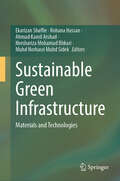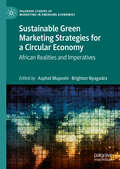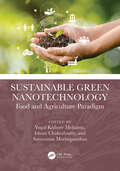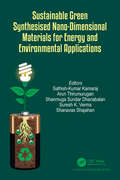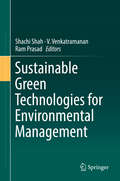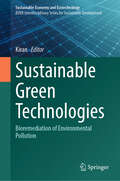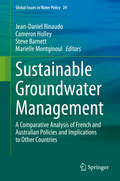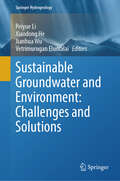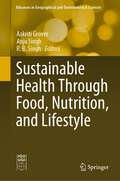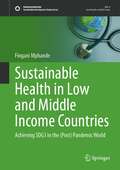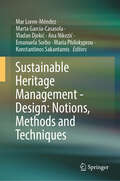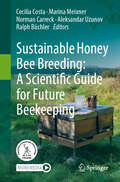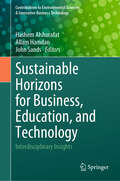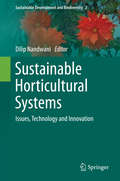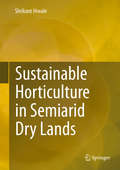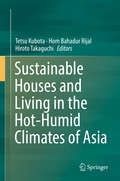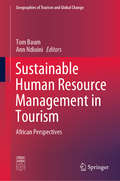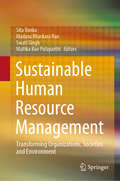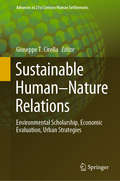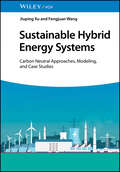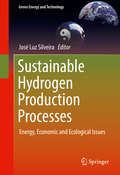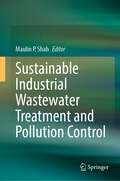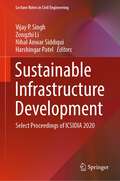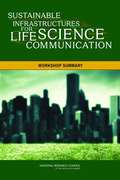- Table View
- List View
Sustainable Green Infrastructure: Materials and Technologies
by Rohana Hassan Ahmad Kamil Arshad Muhd Norhasri Muhd Sidek Norshariza Mohamad Bhkari Ekarizan ShaffieThis book highlights the integration of eco-friendly infrastructure, innovative materials, and advanced technologies to build sustainability and resilience in both urban and rural environments. It explores the sustainability principles, highlighting how green infrastructure can reduce environmental impacts, improve quality of life, and ensure long-term ecological balance. The text emphasizes the importance of technological innovations in achieving sustainable development goals, offering insights into the latest advancements and their applications in creating resilient communities. It significantly contributes to the field by offering in-depth insights into sustainable development across various domains, including timber, pavement, construction, and technology. This volume is a crucial addition to existing literature, serving as an essential reference for future research and application in green infrastructure, materials, and technologies. Its wide-ranging content makes it an indispensable resource for professionals, scholars, and students dedicated to progressing the areas of green infrastructure and sustainable technological practices.
Sustainable Green Marketing Strategies for a Circular Economy: African Realities and Imperatives (Palgrave Studies of Marketing in Emerging Economies)
by Brighton Nyagadza Asphat MuposhiDeveloping countries are known to be ambivalent to making a transition to green economies due to a fear of investment costs related to clean technologies and the possibility of job losses. This book is founded on the proposition that green marketing governance is central to the transition to a circular economy. Building on seminal work on green marketing in emerging economies, this book develops a micro-macro perspective to present the realities and imperatives that facilitate or inhibit the realisation of the sustainable green marketing agenda in Africa. It examines the willingness of consumers to support sustainable consumption practices such as the sharing economy and to engage with circular economy practices such as recycling and reusing. It also critically reflects on the strategies, commitments and sacrifices that are required for the fulfilment of the sustainable green marketing agenda in Africa. The book is informed by the desired aspirations of the United Nations 2030 Agenda for Sustainable Development and Africa’s developmental blueprint, Agenda 2063.
Sustainable Green Nanotechnology: Food and Agriculture Paradigm
by Yugal Kishore Mohanta Ishani Chakrabartty Saravanan MuthupandianThe book places a strong emphasis on the significance of synthesizing nanomaterials and explores various methods of achieving this, with particular attention given to the production of environmentally friendly or "green" nanomaterials. This book illustrates the current gaps in the agriculture and food industry, and explores the potential applications of nanomaterials within this field. The integration of nanotechnology into the fields of biology and biochemistry holds the potential to exert a significant impact on the food industry in the future. This book comprehensively explores the various facets of design, utilization, and implementation of green nanomaterials within the agriculture and food industry. It delves into their applications in areas such as fertilizers, sensors, food processing, food packaging, and sustainable agricultural practices. Additionally, this book explores the current limitations and potential solutions in the field of green nanomaterials, highlighting their role in fostering a sustainable economy.Features: Addressing the global food crisis and presenting a picture of depleting food reserves Importance of nanomaterials and their efficient utilization Green synthesis of nanomaterials Utilization of green nanomaterials for development of smart and sustainable agriculture Emergence and growing application of green nanomaterials in the food industry Green nanomaterials towards a sustainable economy Existing challenges and limitations, with future prospects of using green nanomaterials in food and agricultural conversion devices
Sustainable Green Synthesised Nano-Dimensional Materials for Energy and Environmental Applications
by Sathish-Kumar Kamaraj Arun Thirumurugan Shanmuga Sundar Dhanabalan Shanavas Shajahan Suresh K. VeThere is a growing interest in applying the UN's sustainable development goals to a variety of sectors. One can use certain principles of green chemistry in the emerging fields of nanoscience and nanotechnology. The green chemistry approach focuses on the creation of nanodimensional materials that have a low environmental impact, are cost-effective, and have no negative consequences on the environment. This book aims to summarise the different alternative green chemical routes. Furthermore, the book describes the use of nano-dimensional materials for sustainable energy generation and environmental remediation applications.
Sustainable Green Technologies for Environmental Management
by Ram Prasad Shachi Shah V. VenkatramananOur Earth is considered as a natural system which organizes and controls itself. However, the present scale of anthropogenic activity is unprecedented in the history of mankind compelling the intelligentia to ponder over the scientific causes of the problems, processes and sustainable and pragmatic solutions. The current rate of resource use and consumption pattern are depleting the planet’s finite resources and damaging life-supporting ecosystems. A large number of toxic substances are increasingly found in air, water, soil, and flora and fauna. We are in the midst of a period of increasing interconnected and complex global challenges that seek action across temporal and spatial scales, diverse sectors, and concerted efforts from global citizens. The environment on account of human’s action has been experiencing imbalances and ecological catastrophe. Environmental issues like global climate change, biodiversity loss, the rapid depletion of natural resources, degradation of global commons, stratospheric ozone depletion have been restricting the safe operating space and transgressing the planetary boundaries endangering the existence of human societies. The global environmental problems if not scientifically managed may end up in the civilizational collapse. Nevertheless, the underlying commonality among these environmental issues is interrelatedness, complexity, and difficulty in identifying and implementing solutions. The global environmental challenges can be managed by adopting sustainable green technologies which dovetails the principles of environmental sustainability with social and ecological sustainability. Green growth is construed as a new development paradigm that sustains economic growth while at the same time ensuring environmental sustainability.
Sustainable Green Technologies: Bioremediation of Environmental Pollution (Sustainable Economy and Ecotechnology)
by KiranThe book &“Sustainable Green Technologies: Bioremediation of environmental pollution&” holds great significance in its fields, as it includes both the most recent research on advanced features of green technology for pollution management associated with bioremediation as well as current knowledge of basic concepts. There is a great need for the application of a thorough essay about bioremediation that covers current, pertinent, and innovative green technologies in a practical field to address the serious environmental issues. This issue focuses in particular on the newly created environmentally friendly novel green technology that uses potential biological agents like plants and microbes to detoxify and decontaminate the pollutants in various environmental domains. The book covered a number of topics, comprising advanced molecular and biochemical methods of pollutant detoxification, diverse phytoremediation techniques, microbial remediation, bioleaching, innovative remediation technologies of different hazardous pollutants, genomics, and proteomics in green bioremediation, and a contemporary applied concept of the green bioremediation process. Therefore, this book will be very helpful to scientists, researchers, professionals, teachers, students, and those working in the environmental issues, bioremediation, environmental management and engineering, environmental biotechnology and microbiology, biochemistry, and life sciences.
Sustainable Groundwater Management: A Comparative Analysis of French and Australian Policies and Implications to Other Countries (Global Issues in Water Policy #24)
by Steve Barnett Jean-Daniel Rinaudo Cameron Holley Marielle MontginoulThis book describes and analyses the diversity of possible approaches and policy pathways to implement sustainable groundwater development, based on a comparative analysis of numerous quantitative management case studies from France and Australia.This unique book brings together water professionals and academics involved for several decades in groundwater policy making, planning or operational management to reflect on their experience with developing and implementing groundwater management policy. The data and analysis presented accordingly makes a significant contribution to the empirical water management literature by providing novel, real world insights unpublished elsewhere. The originality of the contributions also lies in the different disciplinary perspectives (hydrogeology, economics, planning and social sciences in particular) adopted in many chapters. The book offers a unique comparative analysis of France, Australia and experiences in countries such as Chile and the US to identify similarities, but also fundamental differences, which are analysed and presented as alternative policy options – these differences being mainly related to the role of the state, the community and market mechanisms in groundwater management.
Sustainable Groundwater and Environment: Challenges and Solutions (Springer Hydrogeology)
by Peiyue Li Xiaodong He Vetrimurugan Elumalai Jianhua WuThis book addresses this challenge head-on, focusing on the intersection of groundwater sustainability and environmental health. It explores the complex relationship between groundwater management and environmental integrity, delving into topics like the impacts of groundwater extraction on ecosystems, the role of groundwater in climate change adaptation and mitigation, and the effects of surface water-groundwater exchange on groundwater quality. The book also highlights the latest scientific research, technological advancements in the field of sustainable groundwater management. Moreover, this book not only identifies the challenges but also proposes viable solutions. It presents a range of practices, innovative solutions, and policy recommendations to manage groundwater resources effectively while minimizing environmental impact. These will be drawn from a variety of contexts and case studies, making the book a comprehensive guide for researchers, policy makers, practitioners, and students in the field. By providing a holistic perspective on sustainable groundwater management, this book contributes significantly to our collective efforts toward achieving water security and environmental sustainability.
Sustainable Health Through Food, Nutrition, and Lifestyle (Advances in Geographical and Environmental Sciences)
by R. B. Singh Aakriti Grover Anju SinghThis book uncovers the multiple layers of challenges posed to achieve sustainable human health and improves the understanding of interactive areas set by the UN Sustainable Development Goals (1) no poverty, (2) zero hunger, (3) good health and wellbeing, (6) clean water and sanitation, and (11) sustainable cities and communities. The book focuses on conceptual understanding, food, nutrition, lifestyle, and their integration to reinforce the ideas of holistic health principles.' The most important drivers of sustainable health are food, nutrition, and lifestyle. Healthy food is a basic need of human beings. In under-developed regions, people are underweight and facing malnutrition, with a prevalence of deficiency diseases due to low intake of micro-nutrients such as vitamin A, iodine, and protein among others. A good diet as well as lifestyle has a tremendous bearing on a person’s health, emotional stability, and enthusiasm for life. The global coronavirus pandemic has brought unimaginable devastation and hardship in all corners of the globe, questioning the existing healthcare services, health policies, and health planning across the developed and developing countries. It has also exposed the lacunae in understanding health, the base of human happiness. The global community needs to gravely ponder the health issues we are facing and explore sustainable solutions for health recovery and the wellbeing of humanity.
Sustainable Health in Low and Middle Income Countries: Achieving SDG3 in the (Post) Pandemic World (Sustainable Development Goals Series)
by Fingani MphandeThis book highlights lessons from the COVID-19 pandemic and explains how these can be used to build sustainable health systems, especially in Low- and Middle-Income Countries (LMIC). It investigates the impact of outbreak response and management on health sustainability in LMIC from the perspective of SDG3: “Ensuring healthy lives and wellbeing for all at all ages”. Despite strides being made in some areas for SDG target 3.3 to fight communicable diseases, the COVID-19 pandemic has caused interruptions that will considerably affect vaccination coverage as well as the progress that was made, for example: in reducing malaria cases. Vulnerable populations who were already struggling to access their healthcare needs before the pandemic may face even greater challenges at present and in the years to come, post-pandemic. This book considers the progress on attaining the SDG3 targets, specifically: to improve early warning systems for management of national and global health risks, and the effect of pandemics - including but not limited to the COVID-19 pandemic - and emerging disease outbreaks. It explores the weaknesses and strengths in LMIC and how to strengthen capacities in these countries. The author also investigates and proposes approaches that can, or should, be implemented to ensure sustainable health systems in developing countries, including early warning systems, risk reduction, and the management of global and national health risks. This book is of great interest to public health professionals, infectious diseases experts, and epidemiologists, as well as students and researchers of public health systems and healthcare infrastructure in developing countries.
Sustainable Heritage Management - Design: Notions, Methods and Techniques
by Mar Loren-Méndez Marta García-Casasola Vladan Djokić Ana Nikezić Emanuela Sorbo Maria Philokyprou Konstantinos SakantamisThis book is coordinated by the UNESCO Chair on Modern Urban heritage CREhAR (Creative Research and Education on heritage Assessment and Regeneration), at the School of Architecture, Universidad de Sevilla (USE), institutions and their research groups which constitute a benchmark for research on cultural heritage and sustainability. Developed in the context of a European network of five universities, University of Belgrade, Serbia; University of Seville, Spain; IUAV University of Venice, Italy; University of Cyprus, Cyprus; and Aristotle University of Thessaloniki, Greece- this consortium on heritage and sustainability have been collaborating closely, both as authors and editors. This book contributes to opening the way to managing heritage from a sustainable perspective, characterizing it from a holistic approach that includes environmental conservation and bioclimatic design. The central innovation of this contribution rests on combining the processes and methods of the heritage studies with those of the project within the field of Architecture and Urban Planning. The volume is structured into five sections: from the concepts, methods and tools, without forgetting the training in proper documental search and systematization, characterization and values identification, key to define criteria to design strategies and actions. Addressed in three transversal perspectives: education, practice, and research, it gives an integral and complete answer to students, practitioners, and researchers. Regarding its contribution to the literature in the field, this volume offers an international publication in the combined fields of heritage and sustainability, providing both conceptual and specific didactic contents and materials, for what is needed to deal with the complex process involved in heritage management. It looks for quality proceedings to project integrated actions on heritage assets, from a transdisciplinary perspective. This book promotes decision making on expert knowledge and cultural values; the proper use of methods, strategies and tools, and reaches agreements through participation of the different agents involved.
Sustainable Honey Bee Breeding: A Scientific Guide for Future Beekeeping
by Norman Carreck Cecilia Costa Marina Meixner Aleksandar Uzunov Ralph BüchlerThis book is the result of collaborative efforts which have taken place over the past 20 years within the COLOSS network, when the factor &“bee origin&” was first put into the equation of factors involved in colony losses. It aims to provide beekeepers, apicultural students, and beekeeping enthusiasts with the scientific background necessary to understand these new ideas, so that future beekeeping may be based on existing &“local&” bee genotypes which can then be improved by selective breeding. The work is divided into two parts. The first section briefly tells the story of honey bees, their origins and their long association with humans, the development of bee breeding and selection and finally the scientific and anecdotal evidence that show that local bees are better for the environment and for beekeeping itself. The second part provides a practical guide to techniques for sustainable bee breeding and selection, ranging from setting up performance testing, to the cost of selection, through methods for rearing queens and making selection decisions, including many aspects related to the control of the very special mating biology of the honey bee. Authored by an expert team of more than 30 scientists, extension specialists and beekeepers from 16 countries around the world, the present synopsis provides all theoretical and practical aspects of honey bee breeding. It is rich in figures and vivid case studies, including hands-on interviews with bee breeders and other stakeholders. Final, a supplementary video can be accessed online as well as directly from the print book; simply download the free Springer Nature More Media App and scan the link in the accompanying figure caption.
Sustainable Horizons for Business, Education, and Technology: Interdisciplinary Insights (Contributions to Environmental Sciences & Innovative Business Technology)
by Allam Hamdan Hashem Alshurafat John SandsThis book offers a detailed analysis of the intersection of sustainability, innovation, and global progress, and it comprehensively explores sustainable practices and their impact on business, education, and technology. The book shows how businesses can incorporate sustainability into their core operations, including environment-friendly supply chains, renewable energy adoption, circular economy models, ethical decision-making, and sustainable growth strategies. Successful sustainable businesses and the benefits of their socially responsible practices are highlighted. In addition, the book explores how education can shape a sustainable future. It is necessary to integrate the ideas of sustainability into the curricula of early childhood education to higher learning institutions to educate and empower the next generation of changemakers. The role of technology in advancing sustainability efforts is also investigated, including artificial intelligence, blockchain, clean energy solutions, green architecture, and smart cities. Other topics explored in the book include global sustainability efforts such as international collaborations, public-private partnerships, and multilateral initiatives; the role of governments, NGOs, and international organizations in promoting sustainable development; ethical considerations and social impacts of sustainable practices, for example, social justice, inclusivity, and environmental stewardship; connections between sustainable development and improved quality of life; and groundbreaking ideas and innovations for industries to tackle sustainability issues. The book offers a comprehensive and forward-looking perspective on sustainability. By combining different viewpoints, the book empowers readers with the knowledge and inspiration to contribute meaningfully to a more sustainable, inclusive, and resilient world.
Sustainable Horticultural Systems
by Dilip NandwaniSustainable horticulture is gaining increasing attention in the field of agriculture as demand for the food production rises to the world community. Sustainable horticultural systems are based on ecological principles to farm, optimizes pest and disease management approaches through environmentally friendly and renewable strategies in production agriculture. It is a discipline that addresses current issues such as food security, water pollution, soil health, pest control, and biodiversity depletion. Novel, environmentally-friendly solutions are proposed based on integrated knowledge from sciences as diverse as agronomy, soil science, entomology, ecology, chemistry and food sciences. Sustainable horticulture interprets methods and processes in the farming system to the global level. For that, horticulturists use the system approach that involves studying components and interactions of a whole system to address scientific, economic and social issues. In that respect, sustainable horticulture is not a classical, narrow science. Instead of solving problems using the classical painkiller approach that treats only negative impacts, sustainable horticulture treats problem sources.
Sustainable Horticulture in Semiarid Dry Lands
by Shrikant HiwaleThis book discusses ways of increasing production/unit area by making full use of the soil and water under the harsh climatic conditions of semiarid areas. This leads to improved sustainability, increased availability of fresh produce, which is vital for human health and higher incomes for small and marginal farmers. Arid and semiarid areas account for almost 70 per cent of the total cropped area of India. In these areas physical constraints like low and erratic rainfall, high temperature, high wind velocity, low fertility, poor soil structure, salinity of soil and ground water all limit reliable crop production. In the absence of any type of aggregation, the soils are highly erodible, lack structure and have a very coarse in texture with low water holding capacity. Intensive agricultural practices, increasing population pressure, climatic changes, environmental pollution, loss of biodiversity, soil erosion, salinization and water depletion are all threatening the sustainability of agriculture. In view of the mounting demand for food, it is vital to link enhanced food production with nutritional security, conservation of natural resources, increasing farmers' incomes, employment generation through agricultural diversification. Horticulture, particularly of fruit trees, can play a major role in solving the problem of nutrition, as fruits are rich source of vitamins and minerals and have antioxidant properties. Fruit trees, which are mostly deciduous, add leaf litter to the soil, and this ultimately helps to improve the condition of the soil. In addition, fruit trees are known to reduce soil erosion and reduce run off. The trees also play a major role in purifying the environment as they are the known carbon sequesters. Fruit-tree cultivation is a profitable preposition. There is no scope to increase the land surface; all increase in productivity therefore has to be from the available land. This means introducing cropping systems that can meet the basic food, fodder and fuel requirement of farming families.
Sustainable Houses and Living in the Hot-Humid Climates of Asia
by Tetsu Kubota Hom Bahadur Rijal Hiroto TakaguchiThis book provides information on the latest research findings that are useful in the context of designing sustainable houses and living in rapidly growing Asian cities. The book is composed of seven parts, comprising a total of 50 chapters written by 53 authors from various countries, mainly in the Asian region. Part I introduces vernacular houses in different Asian countries such as Indonesia, Malaysia, India, Nepal, China, Thailand and Laos. Parts II and III then explore in depth indoor adaptive thermal comfort and occupants’ adaptive behavior, focusing especially on those in hot-humid climates. Part IV presents detailed survey results on household energy consumption in various tropical Asian cities, while Part V analyses the indoor thermal conditions in both traditional houses and modern houses in these countries. Several real-world sustainable housing practices in Asian cities are reviewed in the following part. The final part then discusses the vulnerability of expanding Asian cities to climate change and urban heat island. Today, approximately 35-40% of global energy is consumed in Asia, and this percentage is expected to rise further. Energy consumption has increased, particularly in the residential sector, in line with the rapid rise of the middle class. The majority of growing Asian cities are located in hot and humid climate regions, and as such there is an urgent need for designers to provide healthy and comfortable indoor environments that do not consume non-renewable energy or resources excessively. This book is essential reading for anyone with an interest in sustainable house design in the growing cities of Asia.
Sustainable Human Resource Management in Tourism: African Perspectives (Geographies of Tourism and Global Change)
by Tom Baum Ann NdiuiniThis book addresses the application of sustainable HRM principles within tourism in the specific context of Africa, a neglected area of study. It draws on diverse aspects of HRM, from the micro- (individual) through the meso-level (organisational) to the macro-level (policy, governmental). It also reflects the diverse challenges facing a critical area within emerging African tourism, that of its workforce. The book is substantially research-based and provides a state-of-the-art picture of emergent studies in this area, drawing on case examples from a wide-range of African contexts. As such, it provides a comprehensive resource and starts discussion in an emergent research area.
Sustainable Human Resource Management: Transforming Organizations, Societies and Environment
by Sita Vanka Madasu Bhaskara Rao Swati Singh Mallika Rao PulaparthiThis book provides a multi-stakeholder perspective on sustainable HRM for the policymakers, managers and academics, addressing issues, approaches, research studies/frameworks and emerging patterns relating to the subject. It discusses various aspects of sustainability, such as making HR more responsible for ensuring sustainability focusing on the triple bottom line, characteristics of sustainable HRM, psychological contracts, emotional intelligence, and psychological capital. The book also explores organizational citizenship behavior, employment relations, employee engagement, sustainable leadership, disruptive HR practices, sustaining employee motivation, educational sustainability, sustainable career management, sustainable environment, employer and employee branding, sustainable organizations, organization culture, training for sustainability, sustainable employee performance, business sustainability and sustainable employability. It provides an update on the concept, processes, issues and emerging paradigms from multidimensional and cross-country perspectives to showcase sustainable HR practices, and appeals to the academics, practitioners and policymakers in the area of HRM.
Sustainable Human–Nature Relations: Environmental Scholarship, Economic Evaluation, Urban Strategies (Advances in 21st Century Human Settlements)
by Giuseppe T. CirellaThis book addresses sustainability thinking and the bigger picture, by taking into consideration how and from where contemporary schools of thought emerged approximately a quarter-century ago. Evidence from the literature illustrates a number of key concepts and techniques that have been tested and continue to be tested, within various multi-disciplinary fields, on societal functionality. Research into sustainable societies needs to be sound, ethical, and creative. A cross-sectoral, interdisciplinary examination of challenges and strategies is used to interlink sustainability thinking and human-nature relations. With an ever-growing number of people now concentrated within urban areas, providing not only environmental quality and livable space, but also security and resilient urban systems, is becoming increasingly important. This urbanization trend has overlapped with environmental degradation, consumption of natural resources, habitat loss, and overall ecosystem change. Consequently, the goal is for cleaner, safer societies – with higher standards of living – to excel in support of current and future generational communities. The book tackles these challenges by integrating environmental scholarship, economic evaluation, and urban strategies under one umbrella of thought. The relational paradigms presented include examples that correlate developed and developing countries, socioeconomics and community development, and governance of knowledge and education. As such, the book argues, furthering of knowhow should be accessible and shared in order to achieve maximum innovation and benefit. Sustainability thinking, after all, is a metric for intrinsic human-nature relations in terms of past performance, present development, and future goals. This book discusses this metric and offers novel approaches to growing societies and what we can do next.
Sustainable Hybrid Energy Systems: Carbon Neutral Approaches, Modeling, and Case Studies
by Jiuping Xu Fengjuan WangSustainable Hybrid Energy Systems Discovering comprehensive approaches to build sustainable hybrid energy systems Hybridization is the eternal theme of human energy utilization. However, it has never been more important than it is now because of the urgency of promoting energy transition and achieving carbon neutrality. Therefore, exploring the design, combustion, operation, and policy challenges of sustainable hybrid energy systems becomes increasingly important. Sustainable Hybrid Energy Systems: Carbon Neutral Approaches, Modeling, and Case Studies provides a detailed explanation of these aspects. Dividing hybrid energy systems into three categories—co-located, co-combusted, and co-operated, this book emphasizes the deployment optimization, emission quota allocation, scheduling coordination, and renewable portfolio standards implementation of these systems. The results are essential tools for understanding the current and future of multi-input single-output hybrid energy systems. Sustainable Hybrid Energy Systems readers will also find: Clear logical framework that reveals the constitutes of hybrid energy systems.Systematic technical scheme for building an economic, environmental, flexible, and resilient future energy system.Extensive case studies from single power plant level, multiple power plant level, and grid level.Effective guidelines for wider application of the proposed carbon neutral approaches. Sustainable Hybrid Energy Systems is ideal for power engineers, electrical engineers, scientists in industry, and environmental researchers looking to understand these energy solutions. It will also provide collectible value for libraries.
Sustainable Hydrogen Production Processes
by José Luz SilveiraThis work presents a comprehensive investigation of the most significant renewable hydrogen production processes. Technical, economic and ecological studies are described for the processes of steam reforming of ethanol, natural gas and biogas; water electrolysis with energy from renewable sources (wind power, photovoltaic and hydroelectric), and hydrogen production using algae. Aimed at mechanical and chemical engineering graduate students and researchers involved in environmental sciences, sustainable energy and bioenergy research, this book introduces readers to the latest developments in the field and provides essential reference material for future research. The book first presents a comprehensive literature review of the processes studied. Subsequently, it provides a technical report on assessing the energetic efficiency for each hydrogen production process, as well as an economic study of the respective hydrogen production costs. Lastly, the ecological efficiency of each process is addressed. Over the past few decades, the UNESP's Group of Optimization of Energetic Systems, headed by Professor Jos#65533; Luz Silveira, has been pursuing research in the field of renewable energy generation. A major part of the group's research focuses on the production of hydrogen as a fuel and its important contribution to mitigating the environmental impacts caused by pollutant emissions.
Sustainable Industrial Wastewater Treatment and Pollution Control
by Maulin P. ShahThis book summarizes the advanced sustainable trends in removing toxic pollutants by environmental and biotechnological processes from both industrial wastewater and sewage wastewater. The book also provides an assessment of the potential application of several existing wastewater bioremediation techniques and introduces new cutting-edge technologies. Among other valuable information covered, here are the methods, procedures, materials (especially low-cost materials originating from industrial and agricultural waste), management of wastewater containing toxic pollutants, and valorization possibilities of waste resulting from the removal of toxic pollutants from wastewater.Tonnes of hazardous waste pollutants released by industries are a challenge worldwide. With the ever-growing population and shrinking landfill areas, managing the disposal of pollutants is a matter of severe concern. Industrial wastewater treatment, recycling, and reuse are serious issues in today’s context, not just to protect the environment from pollution, but also to conserve water resources so that water stress is reduced.This book is designed for engineers, scientists, and other professionals and serves as a good summary of the current state-of-the-art and innovative research challenges to control pollution for coming generations.
Sustainable Infrastructure Development: Select Proceedings of ICSIDIA 2020 (Lecture Notes in Civil Engineering #199)
by Vijay P. Singh Zongzhi Li Nihal Anwar Siddiqui Harshingar PatelThis book presents the select proceedings of the International Conference on Sustainable Infrastructure Development: Innovations and Advances (SIDIA 2020). The book addresses the issues of optimal resource allocation and utilization, construction cost minimization, budget optimization for infrastructure development in hilly terrain as well as plains, to ensure quality and safety with minimal environmental impact. The topics covered include planning, design and construction of sustainable infrastructure projects, policy and practices to be considered for the comprehensive development which is socially inclusive specifically in developing nations, transportation engineering and management which is performance-based and emerging economical models for partnerships, environment engineering and management for ascertaining the best methods for environmental impacts assessment to capture the true indirect costs of a infrastructure project, geotechnical and water resource engineering using new developments, and utilizing the various technological impacts for ensuring disaster preparedness of any region. This book can prove to be useful for beginners, researchers, and professionals interested in the latest advances and innovations in sustainable infrastructure development.
Sustainable Infrastructures for Life Science Communication
by Elizabeth Stallman BrownAdvances in the life sciences - from the human genome to biotechnology to personalized medicine and sustainable communities - have profound implications for the well-being of society and the natural world. Improved public understanding of such scientific advances has the potential to benefit both individuals and society through enhanced quality of life and environmental protection, improved K-12 and undergraduate science education, greater understanding of human connections to the natural world, and more sustainable policies and regulations. Yet few systems of support exist to help life scientist communicators share their research with a broad range of public audiences, or engage the public in discussions about their work. "Sustainable Infrastructures for Life Science Communication" is the summary of a two-part workshop convened in December 2013 and January 2014 by the National Research Council Roundtable on Public Interfaces of the Life Sciences to identify infrastructure-related barriers that inhibit or prohibit life scientists from communicating about their work and characteristics of infrastructure that facilitate or encourage scientists to engage with public audiences. The workshop featured both formal presentations and panel discussions among participants from academia, industry, journalism, the federal government, and nonprofit organizations. The presentations highlighted the motivations of and challenges to life scientist communicators, theoretical approaches to science communication, examples of different types of infrastructure to support science communication, and the need for building more sustainable science communication infrastructures. This report considers communication infrastructure across a range of life science institutions, including federal agencies, academia, industry, and nonprofit organizations and explores novel approaches to facilitate effective science communication.
Sustainable Infrastructures: Proceedings of EGRWSE-23, Volume 3 (Lecture Notes in Civil Engineering #355)
by Krishna R. Reddy Arvind Kumar Agnihotri Ajay BansalThis book contains peer-reviewed and selected papers presented during the International Conference on Environmental Geotechnology, Recycled Waste Materials and Sustainable Engineering (EGRWSE) 2023, held at NIT Jalandhar. It discusses the recent innovations, trends, concerns, practical challenges encountered, and the solutions adopted in waste management and engineering, geotechnical and geoenvironmental engineering, infrastructure engineering and sustainable engineering. This book can serve as a useful resource for researchers, educators, policymakers, and professionals working in the field of civil engineering, chemical engineering, environmental sciences, and public policy.
